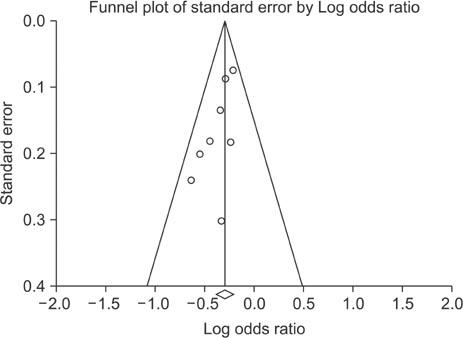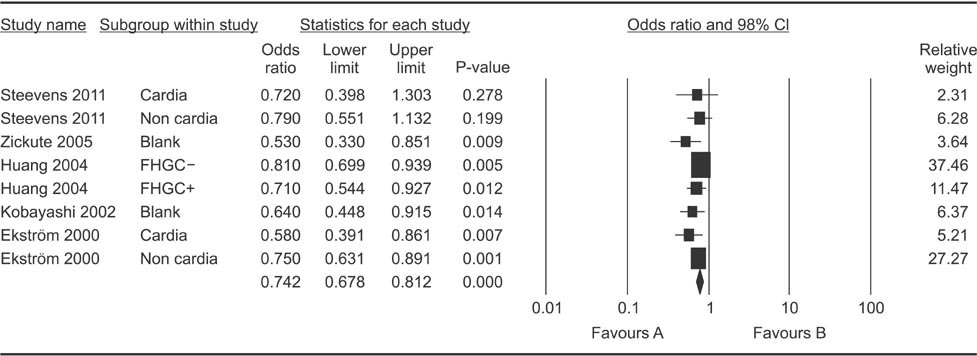J Gastric Cancer.
2015 Dec;15(4):256-261. 10.5230/jgc.2015.15.4.256.
Effect of Carrot Intake in the Prevention of Gastric Cancer: A Meta-Analysis
- Affiliations
-
- 1Research Center of Prevention and Epidemiology of Non-Communicable Disease, Shahid Sadoughi University of Medical Sciences, Iran.
- 2Department of Epidemiology, Faculty of Health, Shahid Sadoughi University of Medical Sciences, Yazd, Iran. namjo14@yahoo.com
- 3Department of Health Education, Faculty of Health, Shahid Sadoughi University of Medical Sciences, Yazd, Iran.
- KMID: 2391560
- DOI: http://doi.org/10.5230/jgc.2015.15.4.256
Abstract
- PURPOSE
Gastric cancer is the third leading cause of cancer-related mortality, with the incidence and mortality being higher in men than in women. Various studies have shown that eating carrots may play a major role in the prevention of gastric cancer. We conducted a meta-analysis to determine the relationship between carrot consumption and gastric cancer.
MATERIALS AND METHODS
We searched multiple databases including PubMed, Cochrane Library, Scopus, ScienceDirect, and Persian databases like Scientific Information Database (SID) and IranMedx. The following search terms were used: stomach or gastric, neoplasm or cancer, carcinoma or tumor, and carrot. Statistical analyses were performed using Comprehensive Meta Analysis/2.0 software.
RESULTS
We retrieved 81 articles by searching the databases. After considering the inclusion and exclusion criteria, 5 articles were included in this study. The odds ratio (OR) obtained by fixed effects model showed that a 26% reduction in the risk of gastric cancer has been associated with the consumption of carrots) OR=0.74; 95% confidence interval=0.68~0.81; P<0.0001). According to funnel graph, the results showed that the possibility of a publication bias does not exist in this study.
CONCLUSIONS
The findings of this study showed an inverse relationship between the consumption of carrots and the risk of gastric cancer.
Keyword
MeSH Terms
Figure
Reference
-
1. Bray F, Ren JS, Masuyer E, Ferlay J. Global estimates of cancer prevalence for 27 sites in the adult population in 2008. Int J Cancer. 2013; 132:1133–1145.2. Rahman R, Asombang AW, Ibdah JA. Characteristics of gastric cancer in Asia. World J Gastroenterol. 2014; 20:4483–4490.3. Alexander GA, Brawley OW. Association of Helicobacter pylori infection with gastric cancer. Mil Med. 2000; 165:21–27.4. Zhu H, Yang X, Zhang C, Zhu C, Tao G, Zhao L, et al. Red and processed meat intake is associated with higher gastric cancer risk: a meta-analysis of epidemiological observational studies. PLoS One. 2013; 8:e70955.5. D'Elia L, Galletti F, Strazzullo P. Dietary salt intake and risk of gastric cancer. Cancer Treat Res. 2014; 159:83–95.6. La Torre G, Chiaradia G, Gianfagna F, De Lauretis A, Boccia S, Mannocci A, et al. Smoking status and gastric cancer risk: an updated meta-analysis of case-control studies published in the past ten years. Tumori. 2009; 95:13–22.7. de Menezes RF, Bergmann A, Thuler LC. Alcohol consumption and risk of cancer: a systematic literature review. Asian Pac J Cancer Prev. 2013; 14:4965–4972.8. de Korwin JD. Epidemiology of Helicobacter pylori infection and gastric cancer. Rev Prat. 2014; 64:189–193.9. Myung SK, Bae WK, Oh SM, Kim Y, Ju W, Sung J, et al. Green tea consumption and risk of stomach cancer: a meta-analysis of epidemiologic studies. Int J Cancer. 2009; 124:670–677.10. Foschi R, Pelucchi C, Dal Maso L, Rossi M, Levi F, Talamini R, et al. Citrus fruit and cancer risk in a network of case-control studies. Cancer Causes Control. 2010; 21:237–242.11. Huang YX, Qin LQ, Wang PY. Meta-analysis of the relationship between dairy product consumption and gastric cancer. Zhonghua Yu Fang Yi Xue Za Zhi. 2009; 43:193–196.12. Tong X, Li W, Qin LQ. Meta-analysis of the relationship between soybean product consumption and gastric cancer. Zhonghua Yu Fang Yi Xue Za Zhi. 2010; 44:215–220.13. Abioye AI, Odesanya MO, Abioye AI, Ibrahim NA. Physical activity and risk of gastric cancer: a meta-analysis of observational studies. Br J Sports Med. 2015; 49:224–229.14. Lunet N, Lacerda-Vieira A, Barros H. Fruit and vegetables consumption and gastric cancer: a systematic review and meta-analysis of cohort studies. Nutr Cancer. 2005; 53:1–10.15. Zickute J, Strumylaite L, Dregval L, Petrauskiene J, Dudzevicius J, Stratilatovas E. Vegetables and fruits and risk of stomach cancer. Medicina (Kaunas). 2005; 41:733–740.16. Higgins JP, Thompson SG. Quantifying heterogeneity in a meta-analysis. Stat Med. 2002; 21:1539–1558.17. DerSimonian R, Laird N. Meta-analysis in clinical trials. Control Clin Trials. 1986; 7:177–188.18. Kobayashi M, Tsubono Y, Sasazuki S, Sasaki S, Tsugane S. JPHC Study Group. Vegetables, fruit and risk of gastric cancer in Japan: a 10-year follow-up of the JPHC Study Cohort I. Int J Cancer. 2002; 102:39–44.19. Huang XE, Hirose K, Wakai K, Matsuo K, Ito H, Xiang J, et al. Comparison of lifestyle risk factors by family history for gastric, breast, lung and colorectal cancer. Asian Pac J Cancer Prev. 2004; 5:419–427.20. Steevens J, Schouten LJ, Goldbohm RA, van den Brandt PA. Vegetables and fruits consumption and risk of esophageal and gastric cancer subtypes in the Netherlands Cohort Study. Int J Cancer. 2011; 129:2681–2693.21. Ekström AM, Serafini M, Nyrén O, Hansson LE, Ye W, Wolk A. Dietary antioxidant intake and the risk of cardia cancer and noncardia cancer of the intestinal and diffuse types: a population-based case-control study in Sweden. Int J Cancer. 2000; 87:133–140.22. Huedo-Medina TB, Sánchez-Meca J, Marín-Martínez F, Botella J. Assessing heterogeneity in meta-analysis: Q statistic or I2 index? Psychol Methods. 2006; 11:193–206.23. Sharma KD, Karki S, Thakur NS, Attri S. Chemical composition, functional properties and processing of carrot-a review. J Food Sci Technol. 2012; 49:22–32.24. Krinsky NI. Antioxidant functions of carotenoids. Free Radic Biol Med. 1989; 7:617–635.25. Palozza P, Krinsky NI. Antioxidant effects of carotenoids in vivo and in vitro: an overview. Methods Enzymol. 1992; 213:403–420.26. Nagai T, Inoue R, Inoue H, Suzuki N. Preparation and antioxidant properties of water extract of propolis. Food Chem. 2003; 80:29–33.27. Lauren P. The two histological main types of gastric carcinoma: diffuse and so-called intestinal-type carcinoma. An attempt at a histo-clinical classification. Acta Pathol Microbiol Scand. 1965; 64:31–49.28. Forman D, Burley VJ. Gastric cancer: global pattern of the disease and an overview of environmental risk factors. Best Pract Res Clin Gastroenterol. 2006; 20:633–649.29. Helicobacter and Cancer Collaborative Group. Gastric cancer and Helicobacter pylori: a combined analysis of 12 case control studies nested within prospective cohorts. Gut. 2001; 49:347–353.30. Wu QJ, Yang Y, Wang J, Han LH, Xiang YB. Cruciferous vegetable consumption and gastric cancer risk: a meta-analysis of epidemiological studies. Cancer Sci. 2013; 104:1067–1073.31. Lee SA, Kang D, Shim KN, Choe JW, Hong WS, Choi H. Effect of diet and Helicobacter pylori infection to the risk of early gastric cancer. J Epidemiol. 2003; 13:162–168.32. Epplein M, Nomura AM, Hankin JH, Blaser MJ, Perez-Perez G, Stemmermann GN, et al. Association of Helicobacter pylori infection and diet on the risk of gastric cancer: a case-control study in Hawaii. Cancer Causes Control. 2008; 19:869–877.33. Machida-Montani A, Sasazuki S, Inoue M, Natsukawa S, Shaura K, Koizumi Y, et al. Association of Helicobacter pylori infection and environmental factors in non-cardia gastric cancer in Japan. Gastric Cancer. 2004; 7:46–53.34. González CA, Pera G, Agudo A, Bueno-de-Mesquita HB, Ceroti M, Boeing H, et al. Fruit and vegetable intake and the risk of stomach and oesophagus adenocarcinoma in the European Prospective Investigation into Cancer and Nutrition (EPIC-EURGAST). Int J Cancer. 2006; 118:2559–2566.
- Full Text Links
- Actions
-
Cited
- CITED
-
- Close
- Share
- Similar articles
-
- Dietary intakes of citrus fruit and risk of gastric cancer incidence: an adaptive meta-analysis of cohort studies
- Epidemiology of gastric cancer in Korea
- Coffee Intake and Risk of Hypertension: A Meta-Analysis of Cohort Studies
- Statin Intake and Gastric Cancer Risk: An Updated Subgroup Meta-analysis Considering Immortal Time Bias
- Helicobacter pylori Eradication Therapy and Gastric Cancer Prevention




